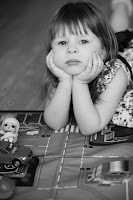Our children and their mental health
Did you know that the first week of February is Children's Mental Health Week? No? Neither did I. Although there has been growing awareness for the importance of mental health over recent years, awareness for children's mental health is still patchy and unfortunately, due to serious under-funding, services are still very limited in some areas.
As adults, the vast majority of us have found the last twelve months difficult. The pandemic has swept away our normal lives and left us clinging to whatever glimmers of hope we can find. Our children are no different. In fact, they have probably felt the impact of the pandemic just as keenly as we have. In the last year, our children have missed out on six months in school. That's six months of missed time spent with their friends, learning vital social and communication skills. On top of that, opportunities to do things outside of the home have been limited and many children have not seen grandparents, cousins or other family members since the pandemic began. We have had to teach our children to keep their distance, enforce incredibly strict hygiene measures and every aspect of their lives has changed in some way. For young minds, this has the potential to be catastrophic.
You may have noticed that your children are more emotional that usual. Perhaps their sleep patterns have changed and they are struggling to switch off? Maybe your child, who was previously calm, is not more argumentative and confrontational when it comes to seemingly simple things such as bath time and getting dressed. I know that with my own children, arguments are much quicker to start and harder to calm down again.
We often feel, as parents, that it is our job to fix every problem. Our children look to us for solutions o their issues and when we can't, it leaves us feeling as though we have failed. Unfortunately, Covid is one problem that we simply can't fix. But there are things that we can do to help minimise the impact on their mental health.
What can I do?
The first, and probably most important, piece of advice I can give you is to make sure that you are looking after your own mental health. You can't pour from an empty cup and, similarly, you can't constantly give of yourself if you are running on empty. Make sure that you are taking some time out to look after yourself amongst the chaos. Whether you choose to go for a walk, take that bubble bath your been promising yourself for months, reading a chapter of the book you last picked up in July or something else, self-care is vital to ensure that you are functioning at your best.
Next, make sure that your children know they can talk to you about anything that is worrying them. Some children will try to keep their emotions hidden because they feel ashamed or worry that you will be unhappy if they tell you how they are feeling. A good way of making sure that your children recognise you as a safe space is to try and make some specific one-on-one time with them. This doesn't have to be anything huge and can be as simple as ten minutes spent chatting before bedtime, but it is a very important habit to make. Talk about the things they feel went well that day and the things that perhaps didn't go so well. In child-simple terms, share some of the highs and lows of your own day so that they know it is safe to have mixed emotions about things. Obviously it wouldn't be appropriate to share your fears over finances or grown up topics, but saying that you miss nanny would be a good opening for a child to voice their own worries. One of my children finds it very difficult to talk about their emotions, so we write letters to each other.
Children really thrive on routine and this is definitely something which tends to be lacking in lockdown life. I know that for my family personally, it takes a huge amount of effort to stick to a routine when one day kind of runs in to the next without any kind of differentiation. if you are struggling with a lack of sleep and an increase in arguments then it could be that you need to add a little more structure to your day. Simple things such as making sure that everyone gets dressed and specifying a time for screens to be turned off can help to give the feeling of routine. make sure to add some time to get outside each day too. Running around in the fresh air will help to burn off some of the excess energy that they have from being cooped up inside.
Although I can share with you my tips and suggestions of ideas which have been recommended to me or things which have helped my family, I am in no way an expert. if you feel as though you have tried everything without success, don't lose hope. There are charities and organisations out there which specialise in children's mental health. Contacting them doesn't mean that you have failed in any way, it simply means that you are looking for advice and doing your best to navigate an impossible situation. Asking for help from the experts is sometimes the best thing to do for everyone involved.
Organisations which can help:
Place2Be - www.place2be.org.uk
Young Minds - www.youngminds.org.uk
Mind - www.mind.org.uk
Camhs - This is the children and adolescent mental health service. Your GP can refer you.



Comments
Post a Comment